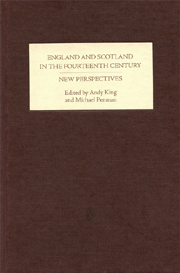Book contents
- Frontmatter
- Contents
- List of Contributors
- Acknowledgements
- Abbreviations
- 1 Introduction: Anglo-Scottish Relations in the Fourteenth Century – An Overview of Recent Research
- 2 The English Army and the Scottish Campaign of 1310–1311
- 3 ‘Shock and Awe’: The Use of Terror as a Psychological Weapon during the Bruce–Balliol Civil War, 1332–1338
- 4 The Scots and Guns
- 5 Edward Balliol: A Re-evaluation of his Early Career, c. 1282–1332
- 6 Scoti Anglicati: Scots in Plantagenet Allegiance during the Fourteenth Century
- 7 Best of Enemies: Were the Fourteenth-Century Anglo-Scottish Marches a ‘Frontier Society’?
- 8 Dividing the Spoils: War, Schism and Religious Patronage on the Anglo-Scottish Border, c.1332–c.1400
- 9 The Pope, the Scots, and their ‘Self-Styled’ King: John XXII's Anglo-Scottish Policy, 1316–1334
- 10 Sovereignty, Diplomacy and Petitioning: Scotland and the English Parliament in the First Half of the Fourteenth Century
- 11 National and Political Identity in Anglo-Scottish Relations, c.1286–1377: A Governmental Perspective
- 12 Anglici caudati: abuse of the English in Fourteenth-Century Scottish Chronicles, Literature and Records
- 13 Anglo-Scottish Relations in the Later Fourteenth Century: Alienation or Acculturation?
- Index
11 - National and Political Identity in Anglo-Scottish Relations, c.1286–1377: A Governmental Perspective
Published online by Cambridge University Press: 12 September 2012
- Frontmatter
- Contents
- List of Contributors
- Acknowledgements
- Abbreviations
- 1 Introduction: Anglo-Scottish Relations in the Fourteenth Century – An Overview of Recent Research
- 2 The English Army and the Scottish Campaign of 1310–1311
- 3 ‘Shock and Awe’: The Use of Terror as a Psychological Weapon during the Bruce–Balliol Civil War, 1332–1338
- 4 The Scots and Guns
- 5 Edward Balliol: A Re-evaluation of his Early Career, c. 1282–1332
- 6 Scoti Anglicati: Scots in Plantagenet Allegiance during the Fourteenth Century
- 7 Best of Enemies: Were the Fourteenth-Century Anglo-Scottish Marches a ‘Frontier Society’?
- 8 Dividing the Spoils: War, Schism and Religious Patronage on the Anglo-Scottish Border, c.1332–c.1400
- 9 The Pope, the Scots, and their ‘Self-Styled’ King: John XXII's Anglo-Scottish Policy, 1316–1334
- 10 Sovereignty, Diplomacy and Petitioning: Scotland and the English Parliament in the First Half of the Fourteenth Century
- 11 National and Political Identity in Anglo-Scottish Relations, c.1286–1377: A Governmental Perspective
- 12 Anglici caudati: abuse of the English in Fourteenth-Century Scottish Chronicles, Literature and Records
- 13 Anglo-Scottish Relations in the Later Fourteenth Century: Alienation or Acculturation?
- Index
Summary
During the reigns of Edward I, II and III, the king of England claimed dominion over a number of territories beyond England itself: Wales, Ireland, Gascony and other remaining French possessions, and, from 1337, the whole of France. English claims to overlordship of Scotland from 1290 thus fitted into the broader context of what the late Rees Davies has dubbed ‘the first English empire’, a shifting range of territories over which the king of England claimed varying degrees of authority. Consequently, while all English people were subjects of the king of England, not all subjects of the king of England were English. What, then, was the role of national identity and nationality in this complex political world? What was the relationship between national identity and political allegiance? Was nationality politically significant at all?
The issue is particularly complicated with respect to Scotland because the English king's lordship there was, for the most part, much less direct than the colonial-style rule imposed in Ireland, Gascony and Wales. Moreover, it is well known that the relationship between allegiance and nationality during the Scottish Wars of Independence was far from straightforward. By 1296, when conflict broke out, a long period of relatively peaceful co-existence had created networks of cross-border landholding, office-holding, inter-marriage, kinship and ecclesiastical patronage, connections which appear to have created what Tuck has called ‘a genuine dilemma’ of allegiance for some, particularly landholders, when they were forced to choose sides.
- Type
- Chapter
- Information
- England and Scotland in the Fourteenth CenturyNew Perspectives, pp. 196 - 215Publisher: Boydell & BrewerPrint publication year: 2007



